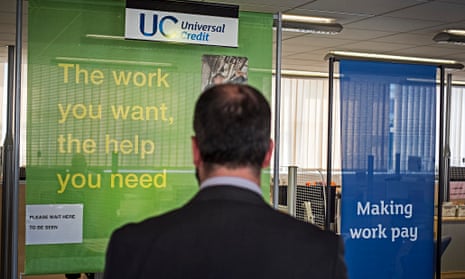I tend to think I am beyond shock at the actions of the Department for Work and Pensions (DWP) now. The expectation that this government is capable of morality or even basic competence was lost some time ago, somewhere between enacting policy that pushes people already in poverty into losing their homes and denying deaf, blind eight-year-olds disability benefits. Still, Dispatches’ Benefits Britain investigation was painful viewing.
During seven weeks of undercover work at a universal credit contact centre in Bolton, Channel 4 journalists witnessed a farcical mess of centralised IT failure. But what really stood out were the underhand tactics DWP staff were found to use against claimants: from deliberately withholding hardship payments from people struggling after having their benefits sanctioned, to hiding the flexible fund put in place to pay for clothes or a bus fare they needed to help them get a job.
“The whole idea is the punishment, that’s what you’ve got to suffer,” one adviser was filmed explaining. This mentality is normal now and beyond Dispatches the evidence is mounting. “I got brownie points for cruelty,” one former DWP adviser told the Guardian last month.
Meanwhile, Jobcentre managers routinely put pressure on staff to sanction claimants’ benefits, according to their union. Failure to instigate or approve enough sanctions is said to result in staff being “subject to performance reviews” or losing pay. Imagine “success” at a jobcentre not being helping a person get a well-paid, fulfilling job but tricking them out of the money they need to feed their children. Punishment and suffering is at the heart of what was once a safety net.
What Dispatches showed is not an isolated incident, a black spot polluting an otherwise untarnished record. It is an example of both attitude and action that runs through the entire system: the growing conditionality on benefits, the withholding of emergency help, all the way back to how benefits are assessed.
As of last week, there is quantitative evidence that the notorious fit-for-work tests are inflicting damage to disabled people’s bodies (not to mention the impact on their minds). Yes, we have now reached a point where the benefit system is making disabled and chronically ill people sicker. Over 60% of disabled people going through the work capability assessment – designed by the DWP and sold off to private firms – report being in pain afterwards. Others said their condition was made worse or their recovery delayed. One claimant surveyed, who has progressive rheumatoid arthritis, said she left her appointment “feeling absolutely awful and suffered a lot of pain in the following days.” She went on to have a stroke a few weeks later.
It might be worth remembering that this is an assessment that is meant to help people – one million people are due to go through the process this year – if only because those orchestrating it appear to have forgotten. It is the same cavalier attitude to the vulnerable that means claimants have killed themselves after being spat out by the benefit system, as if desperation and distress means nothing.
We are sliding back to the notion that suffering helps the soul, that the underclass – be it the unemployed, the disabled, or chronically ill – need to be trained in order to behave. And, as almost a secondary consequence, their punishment cuts the welfare bill down. A bonus all round.
The ideology of a small state or the belief that benefits build dependency are crass, irrelevant details to what at its core is simply a decision about how to treat a human being. This is particularly damning when one person has all the power and the other is forced through economic necessity to take whatever humiliation or pain they are given. To do that to someone – let alone hundreds of thousands – is no accident. It is a conscious decision, that has been made over and over again by this government.





